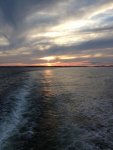toneeees
Administrator
- Joined
- Mar 15, 2011
- Messages
- 3,024
 Preparing for your boat trip can be one of the most enjoyable parts of your trip. As you are planning it you begin to live it in your mind, and that's fun! Then you actually live your plan as you go on your trip. Hopefully that's the most fun part. And finally you can re-live your trip over and over again looking back on what you actually did...and that's fun too!
Preparing for your boat trip can be one of the most enjoyable parts of your trip. As you are planning it you begin to live it in your mind, and that's fun! Then you actually live your plan as you go on your trip. Hopefully that's the most fun part. And finally you can re-live your trip over and over again looking back on what you actually did...and that's fun too!So enjoy the planning process as well as the trip itself and then looking back. Here are a few tips we learned while planning our major boating trip Down East.
1. Use the Internet and Google Earth (as you zoom in) to find out 98+% of the information you will need. Almost all marinas, city docks, restaurants, stores and things to see along the way all have websites that are shown on Google Earth. Finally, call by phone (using Internet web sites you found) to get the last few details you'll need to make your trip terrific.
2. Keep a 3 ring binder while you are planning with different tabs for different topics. For example: (a) for boat-related stuff, (b) calendar, (c) documents (boat and personal), (d) each day's detailed plan w/specific info., reservation #s, phone numbers, etc., (e) important back home family and medical info. (f) where to get weather forecasts online, and other important info. like towing service, Coast Guard phone # and key VHF channels at each stop along the way, your boat dealer's phone number, and finally your engine, boat and electronics tech. support #s.
3. What to do before you go:
A. Plan: where you will stay.
i. Which towns/cities for each day...specifically.
ii. Where to stay;
a. at docks (max. length of boat they can handle).
b. moorings (may have some...or none may be available).
c. anchorage (may be possible in harbor or not, near a town or not).
d. how far to get to town...even if docked at "town" docks you may not be in town.
iii. Services offered; Electric*, water, pump-out (of head), fuel (gas &/or diesel) available where you stay or nearby...or none may be in the area.)
iv. Services needed; ice, wifi, fuel, food (restaurant or groceries), water, tech help.
i. Which towns/cities for each day...specifically.
ii. Where to stay;
a. at docks (max. length of boat they can handle).
b. moorings (may have some...or none may be available).
c. anchorage (may be possible in harbor or not, near a town or not).
d. how far to get to town...even if docked at "town" docks you may not be in town.
iii. Services offered; Electric*, water, pump-out (of head), fuel (gas &/or diesel) available where you stay or nearby...or none may be in the area.)
iv. Services needed; ice, wifi, fuel, food (restaurant or groceries), water, tech help.
B. Costs: lodging when not on the boat, dock/mooring fees, food, fuel, electric*, laundry, pump-out. (The Charlottetown, PEI Yacht Club had no 30 amp power and no pump-out but recommended a pump-out company who charged me $250! Be careful at their marina...or better yet don't stay there.)
C. Do they have cell phone coverage and wifi for Internet connection? Often if they have it, it's poor quality or coverage.
D. Cash (how much to take and can you get more locally? Credit cards...very good to take 1.
E. Know your boat...electronics, head (toilet), engines, dimensions (length, width, beam).
F. How many people are needed to operate boat? Docking and at locks (where 2 are required).
G. Handling your back home affairs, watering plants, a pet, car issues, bill paying while gone.
H. What to take: medications, clothes, maps/charts, technical books about boat/trip/area.
I. Setting up a blog or emailing your trip's daily events to family & friends.
J. Services to order: SPOT tracking device, satellite phone (mostly not needed), Navionics GPS, extra boat insurance (we needed to pay a little more to have coverage as we went into Canada).
K. Documents; customs...have a passport, CAMPASS or not for Canada, boat papers (boat registration, boat insurance docs, etc.)
L. Research online and books on your trip...what do others say about what you are planning?
*Electric: Know what your boat's electric shore power needs are. (Some boats must have 50 amp or 2 x 30 amp power.) Some can use 1 or 2 x 115 volts. Some need different dock power lines versus 2 plugs from same shore line.) Marinas often say they have 30 amp...but you need 2 x 30 amp and when you get there you find out they only have one 30 amp plug. This is not rocket science to learn but you do need to know it for your specific boat. Your dealer can help you with this information or we can help you online in our forums at forums.iboats.com.C. Do they have cell phone coverage and wifi for Internet connection? Often if they have it, it's poor quality or coverage.
D. Cash (how much to take and can you get more locally? Credit cards...very good to take 1.
E. Know your boat...electronics, head (toilet), engines, dimensions (length, width, beam).
F. How many people are needed to operate boat? Docking and at locks (where 2 are required).
G. Handling your back home affairs, watering plants, a pet, car issues, bill paying while gone.
H. What to take: medications, clothes, maps/charts, technical books about boat/trip/area.
I. Setting up a blog or emailing your trip's daily events to family & friends.
J. Services to order: SPOT tracking device, satellite phone (mostly not needed), Navionics GPS, extra boat insurance (we needed to pay a little more to have coverage as we went into Canada).
K. Documents; customs...have a passport, CAMPASS or not for Canada, boat papers (boat registration, boat insurance docs, etc.)
L. Research online and books on your trip...what do others say about what you are planning?
While on the trip...we learned or had strongly reinforced to us these five points.
1. Slow down...look twice...measure twice, cut once. When moving your boat around docks and other boats in wind, currents or tides it is especially important to go slowly! If you have to, back off and start again. Do not let the pressure of other locals watching you cause you to rush or show that you can do it fast or the 1st time. Go much more slowly and be careful...that's the sign of a really great Captain, not a fast hotdog.
2. A really good plan is indispensable to have but it may need to change a little (especially the timing of things) as weather changes and as unforeseen situations happen. That's OK. Don't let the plan be your master...you are still in change and you can change your plan. If you have to skip a port or two to get back on schedule, do it. That's OK too.
3. It is NEVER justified to go out in your boat in terrible weather when you know that there will be small craft warnings, very big (for your boat) waves, high winds, lightening, blinding rain, angry rip tides or a combination of these. Stay in port! If need be, stay in port an extra 2 or 3 or 4 days. We stayed an extra 4 days in Bathurst, NB due to very bad weather. We rented a car and had a great time exploring the province. I also gained points with my wife who was grateful that when we did head out the weather was good and the seas were calm.
4. Do what all airplane pilots do...have a specific and detailed check list that you go through item by item before you head out each time you leave a dock or anchorage with your boat. It is surprising how many things there are to do and/or check on before you put the engine(s) in gear. Are all the fenders up on both sides and secure? Was the circuit breaker for the generator switched on...or is the generator still in the warm-up mode? Was the shore power cord detached from shore power and stowed on the boat? Were the other shore power lines and splitter box collected off the dock and stowed onboard? Was the shore water disconnected? Are all items in the boat stowed in such a way that they will not fall/slip/slam shut when the boat gets underway? Are all things that could be swept overboard by water or wind (clothing and hats especially) stowed? Do all those who need to be wearing a life jacket have one on? Is the anchor up and secured correctly? If needed, is the radar and other electronics turned on and running correctly before you cast off? Are all shore lines untied from the dock and are they safely onboard? Was anyone in the water...and are they now onboard...you are SURE? Have you looked all around the boat to see what is in the water near you...another boat, people, lines or towable tubs and/or ropes? You have looked at the wind and current and determined what will happen to the boat when the dock lines are released? And the list goes on and on. Obviously, a great sea Captain, like a great airplane pilot takes this responsibility very, very seriously. With over 650 hours now in 2 years with this specific boat, I still catch myself forgetting something or another if I don't run through my whole check list before I engaged the engines. Be a great Captain, do the same by using your own check list.
5. To end on a very positive note, we learned that boating together on a major trip...such as for 71 days and almost 3,500 miles...can be, and for us was terrifically fun! We had the time of our lives. Boating really can be an amazing activity and sport to participate in, especially with others. We were saddened to see so few recreational boaters in most of the places we went on out trip. What a shame. May I suggest we all go boating more, it will do us all good.
There are so many wonderful activities that you can do while boating. If you own a boat, use it more...make some new memories, now. Don't wait until sometime in the future as that may never come. Go boating now. If you don't own a boat, get one. And if you can't get a boat right now, find a friend with a boat and offer to split the gas cost and go with him or her. And there are many places where you can rent a boat. Start small and then move up in size as you can. You will NOT regret the time you spend on and around the water. God's gift to men and women is a lovely earth made up of 1/3rd land and 2/3rds water. Let's go boating and enjoy that 2/3rds!
-Bruno Vassel III




















